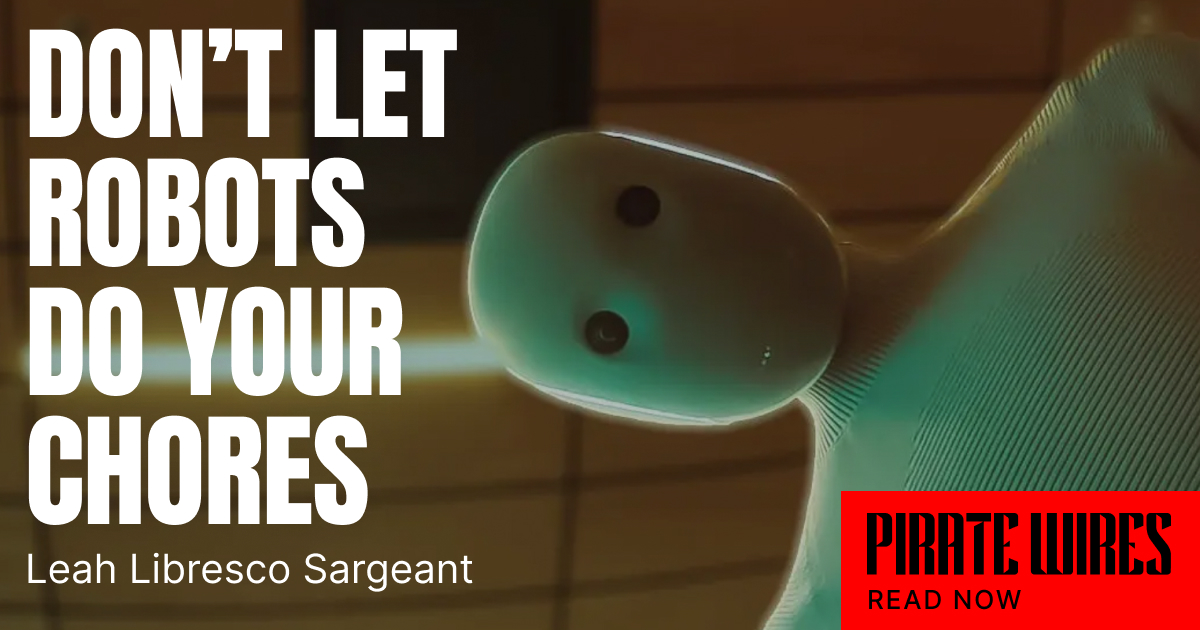Don’t Let Robots Do Your Chores

Last month, 1X, a Norwegian-American tech company, launched Neo, the first home robot available for consumers to buy, sparking much delight (memes), debate, and general intrigue. Assuming the robots become sophisticated enough to actually do chores (for now, they mostly require tele-operation by strangers), it paints a miraculous picture of Rosie the Robot, an apron-wearing domestic helper who cleaned and cooked while the Jetsons zoomed through their airborne utopia — right? Wrong, according to Leah Libresco Sargeant. The author of the new book The Dignity of Dependence, in the following op-ed for Pirate Wires, argues that a home isn’t meant to be automated so much as inhabited. That if we “solve” the drudgery of wiping bottoms with robotic intervention, we just might lose something essential.
—Blake Dodge
Neo, the home robot offered by startup company 1X looks like a very expensive form of vaporware. The humanoid robot is intended to help out around the house, for the subscription price of $499 a month, or $20,000 to own an early version outright. Early adopters, starting next year, will really get a two-for-the-price-of-one deal: a greyscale robot, and an anonymous tele-remote human operator, who puppets Neo from afar and watches you silently though its eyes. The company can’t master autonomous movement without a lot of training data, so they’re counting on enthusiasts to open their homes to their anonymous pilots.
Part of the appeal of a robot servitor is that it removes exposure to another human being. Neo’s marketing avoids calling the robot a live-in servant (gauche for America) but that’s essentially the service they’re attempting to sell. What if you could have a person at your disposal, who didn’t create any of the social ties or obligations that a real person entails? The remote pilot destroys the intended effect — to be served by someone who cannot perceive you need them.
Say Neo finds a market for robot-faces-hiding-human-pilots and makes the jump to full autonomy before the creators run out of runway. There’s another problem. Our current household appliances are not person-shaped, and it’s hard to imagine consumer demand to redesign a dishwasher or a laundry machine so it was more like a humanoid robot, standing by the sink, individually washing dishes. Labor-saving devices tend to work best when they reformulate a task to work in a totally different way. The Neo, reenacting human motions, is more comical than helpful.
Still, the dream of escaping housekeeping is commonly felt. The supposed longing for a Neo-like solution is propelled by doubt that care work (for a home or for a person) is meaningful work. As a parent, I’ve heard pitches for even more implausible robotic interventions. One childless friend, concerned about the birth rate, asked me if I agreed that a diaper-changing robot would make people more likely to have children. Another futurist expected we’d solve the fertility crunch with artificial wombs.
My friends have it wrong. The labor of keeping house isn’t all drudgery; I could hardly say that I like wiping poo off of a baby’s bottom, but it’s impossible to imagine placing a child in a diaper changing contraption. Postulate the machine is as safe as you want — I’ll grant it for the sake of argument. What I wouldn’t want to lose is the particular moments of closeness that came as I knelt by our diaper pad. Even once the new diaper was on, I lingered to blow raspberries on their bellies. I sat and traded nonsense syllables in an echo game. Because the initial part of the change required total focus, I was able to remain in that mode, fully present, caught up with wonder.